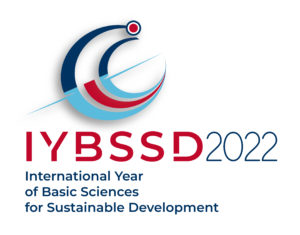 We need more basic sciences to achieve Agenda 2030 and its 17 Sustainable Development Goals. This is the message sent to the world by the United Nations General Assembly on 2 December 2021: Member States approved by consensus the resolution 76/A/L.12 promulgating the year 2022 as the International Year of Basic Sciences for Sustainable Development (IYBSSD2022). (view UN release)
We need more basic sciences to achieve Agenda 2030 and its 17 Sustainable Development Goals. This is the message sent to the world by the United Nations General Assembly on 2 December 2021: Member States approved by consensus the resolution 76/A/L.12 promulgating the year 2022 as the International Year of Basic Sciences for Sustainable Development (IYBSSD2022). (view UN release)
With this resolution, the United Nations General Assembly ‘invites all [its] Member States, organizations of the United Nations system and other global, regional and subregional organizations, as well as other relevant stakeholders, including academia, civil society, inter alia, international and national nongovernmental organizations, individuals and the private sector, to observe and raise awareness of the importance of basic sciences for sustainable development, in accordance with national priorities’.
The United Nations General Assembly motivated its decision with ‘the high value for humankind of basic sciences’, and with the fact that ‘enhanced global awareness of, and increased education in, the basic sciences is vital to attain sustainable development and to improve the quality of life for people all over the world’. It also stressed that ‘basic sciences and emerging technologies respond to the needs of humankind by providing access to information and increasing the health and well-being of individuals, communities, and societies’. The successes and difficulties of the global fight against the COVID-19 pandemic have been for two years a stark reminder of this importance of basic sciences, such as (but not limited to) biology, chemistry, physics, mathematics and anthropology.
The vote is the result of the mobilization of the international scientific community, led since 2017 by the International Union of Pure and Applied Physics (IUPAP), CERN (The European Laboratory for Particle Physics), and 26 other international scientific unions including IUPAC, and by research organizations from different parts of the world, under the auspices of UNESCO. Over 90 national and international science academies, learned societies, scientific networks, research and education centers are also supporting this initiative. They will organize events and activities all over the planet during this special year, to showcase and improve the links between basic sciences and the 17 SDGs.
Christopher Brett, IUPAC President and a member of the IYBSSD Steering Committee, said: “The proclamation of the International Year of Basic Sciences for Sustainable Development is the culmination of a process in which IUPAC, as a founding partner of IYBSSD, has been involved since the beginning. It will give a unique opportunity for promoting the basic sciences and their importance, emphasising the crucial role of chemistry and chemistry’s interdisciplinary nature at the cutting edge of fundamental research through to education and outreach. During IYBSSD, extra impetus will be given to IUPAC’s activities linked to IUPAC’s Global Women’s Breakfast and the IUPAC Periodic Table Challenge, and to fomenting the realisation of regional and national activities through our National Adhering Organisations, Associated Organisations, Company Associates, and other organisations promoting the basic sciences and chemistry. IUPAC is very much looking forward to the international year.”
The resolution was proposed to the United Nations General Assembly by Honduras, and co-sponsored by 36 other countries. Its vote confirms resolution 40/C 76 adopted unanimously by UNESCO General Conference, 25 November 2019. The International Year of Basic Sciences for Sustainable Development (IYBSSD2022) will be officially inaugurated with an opening conference 30 June – 1 8 July 2022 at UNESCO headquarters in Paris. Events and activities will be organized around the world until 30 June 2023.
[Read UN full release > https://www.un.org/press/en/2021/ga12391.doc.htm]
Contacts:
Michel Spiro, president of the Steering Committee for IYBSSD2022 – [email protected]
Luc Allemand, secretary general of IYBSSD2022 – [email protected]
More at https://www.iybssd2022.org
Member organizations of the Steering Committee of IYBSSD2022
International Union of Pure an Applied Physics,
CERN (The European Laboratory for Particle Physics),
UNESCO’s Abdus Salam International Centre for Theoretical Physics, Italy Chinese Academy of Sciences,
European Gravity Observatory,
European Physical Society,
Fonds de recherche du Québec, Canada
Institut de recherche pour le développement, France
International Astronomical Union,
Industrial Council for Industrial and Applied Mathematics,
International geographical Union,
International Institute for Applied Systems Analysis,
International Mathematical Union,
International Mineralogical Association,
International Science Council,
International Union for Vacuum Science, Technique and Application, International Union of Biological Sciences,
International Union of Crystallography,
International Union of Geodesy and Geophysics,
International Union of History and Philosophy of Science and Technology, International Union of Material Research Societies,
International Union of Pure and Applied Chemistry,
Istituto Nazionale di Fisica Nucleare, Italy,
Joint Institute for Nuclear Research, Russian Federation,
Nuclear Physics European Collaboration Committee,
Rencontres du Vietnam,
Scientific Committee on Oceanic Research,
Square Kilometer Array Observatory
Full list of countries who co-sponsored the resolution
Armenia, Azerbaijan, Bahrain, Bolivia, Brasil, Burkina Faso, Chad, Chile, Colombia, Cuba, Dominican Republic, Ecuador, El Salvador, Fiji, Georgia, Guatemala, Honduras, India, Indonesia, Israel, Japan, Jordan, Kyrgyzstan, Malawi, Nicaragua, Panama, Paraguay, Peru, Philippines, Qatar, Russian Federation, Saudi Arabia, Serbia, Spain, South Africa, Thailand, Viet Nam
(edited 23 Feb 2022 to update the date of the opening conference to 8 July 2022)
Homeslide photo by Hal Gatewood on Unsplash
